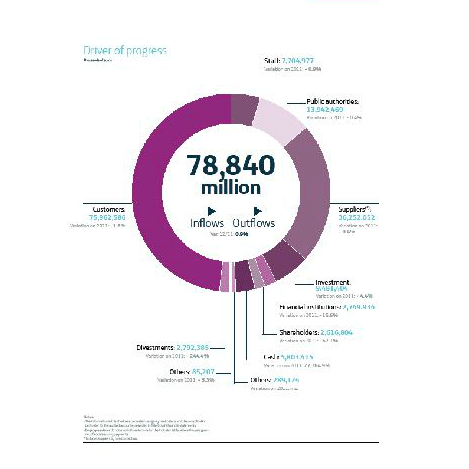 Alberto Andreu Pinillos, Global Corporate Reputation & Responsibility Managing Director at Telefónica…. There has been much debate about the concept of Corporate Social Responsibility. I don’t want to open this perennial debate on measuring CSR here, but I will share my own view with a simple idea:
Alberto Andreu Pinillos, Global Corporate Reputation & Responsibility Managing Director at Telefónica…. There has been much debate about the concept of Corporate Social Responsibility. I don’t want to open this perennial debate on measuring CSR here, but I will share my own view with a simple idea:
CSR is not about how much money the company give to charity or to social programs; CSR is about how you get your income and how much value you generated to your stakeholders with your own business (social programs included).
Let’s see what this means in practice.
…
First; when I talk about how the company gets its revenues, I want to call the attention to the degree of integrity, respect for its stakeholders, transparency and ethical behavior that should guide the way in which any company should operate. Former IBM CEO, Louis V. Gerstner, said some time ago that “corporate culture is what people do when nobody is looking”. How we behave; how we make decisions; how we apply our Ethic Code… All this is a source of value and must be looked after.
For example in Telefónica, we rely on our ethical code or Business Principles. Thanks to them, we develop internal policies and internal procedures, to embed ethical behavior within the day to day management. We are trying to work transversally and to involve as many corporate areas and Opreating Businesses as we can. As evidence of the progress made, OECD, UN and World Bank consider our Business Principles Office (the internal organ that runs the Ethic Code) a best practice internationally.
Second, when I talk about how much value you generated to your stakeholders with your own business (social programs includes) I am talking about the positive business impact in the economic, technological and social development of the countries in which the company operates. Of course, I am including social programs too, but it would be so limitative to think that the social impact of a company is only the impact of its social investment or money devoted to charities.
At Telefónica, we call it “social cash flow”. We calculate it to evaluate our real contribution to society, and we did it since 10 years ago (see chart above). “Social cash flow” is the creation of wealth by the company considering the outflows for employees (wages), suppliers (purchases) , governments (taxes), shareholder (dividend), company (investments). It is what Ed Freeman calls “managing for stakeholders”, in the belief that any company will be more sustainable in the future if it’s able to create value for all. Consider, for example, what it means in terms of economic impact working with nearly 20,000 suppliers in 68 countries. Given all this, our company generated in 2012 wealth valued at 78,840 million euros in 2012 (78,128 in 2011) among its stakeholders , a significant amount acts as an engine of progress.
Certainly there are striking social initiatives, certainly deserve our applause; and we, at Telefónica, do our best investing almost 160 million € on this kind of projecto enhance education and to help young people to win the future. But we don’t let the fireworks to distract us from the essential.
We never forget that technology ultimately benefits all of us, both individually and together, and never more so than when it is used to improve sustainability and close socioeconomic gaps. We want society to BE MORE by adopting the right technology to address the world’s challenges. That is why opening the possibilities of technology to everyone is our key mission.
(Follow me on Twitter @aandreup )
…
Your turn:
[poll id=’22’]
